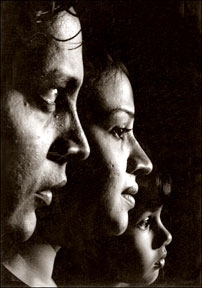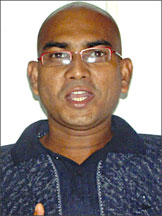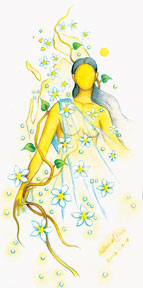Arts
Rasoja:
In search of an illusive Eldorado
by Ranga Chandrarathne
|

A scene from the drama
|
|

Producer Janapriya Jayasinghe
|
Rasoja, a drama by young dramatist Janapriya Jayasinghe will go
onboard on December 23 at 6.31 p.m at the Elphinstone theatre in
Maradana. Jayasinghe's forte is his extraordinary perception of life and
deep insight into the predicament of modern man in a materialistic
world.
The drama is woven around a story of a family. They live in
deprivation in a land of misery. A prolonged drought had robbed the land
of vegetation and crops, leaving the population only to feed on porridge
of rice.
Manula, Sneha and their son Jeevana stay behind because of their love
for the motherland while thousands of men and women abandon the land of
misery and leave for Shashrika Deshaya, an Eldorado. It is a land full
of luxuries and those who migrate will have an easy and luxurious life
free of trouble. Those who land there can live in palaces of their
choice.
However, in order to enter the land of prosperity, one has to cross a
long desert under the scorching sun. The road to prosperity is a
difficult path. Tempted by the brighter prospects of leading a luxurious
life and an equally bright future for their son Jeevana, Sneha wants to
end the miserable life they lead in the land of misery and to join the
men and women leaving for Shashrika Deshaya.
In the middle of the journey, they run out of foods and water,
compelling them to consume one in order that others may reach the
destination. However, attempts by Manula to kill his wife Snesha as well
as parent trying to kill the child, Jeevan failed miserably.
However, Jeevan dies and parent eats his flesh and drinks the blood
and reach Shashrika Deshaya. Though they reach the land of prosperity,
now they can not enjoy the luxurious life and feel something is terribly
missing. It is the child, the very purpose of their lives.
On route to prosperity, they have, though unwittingly, destroyed the
very purpose of their lives and the purpose of the journey. Ultimately,
the arduous journey though leads to the Shashrika Deshaya, land
prosperity, end in a tragedy. The drama ends with a blank note of
parent's turning back on to the desert as if to journey back into the
land of misery.
Here the dramatis expresses the predicament of modern man who is
tempted by the stiff competition in materialistic world to earn more and
more to satisfy insatiable desires. Wittingly or unwittingly he/she
become a part of the rate race in order to persue material gains.
Unbridle consumerism has led to extravagant life style and spending
spree which knows no bounds. What often happened in this inhuman process
is that those who pursue happiness and material gains conveniently
forget the very purpose of the race which, on most of the occasions, is
a better life and a high standard of education for the children.
Drama is based on Buddhist idea of futility of material gains and
fulfilling fleshly desires. The process of wealth accumulation destroys
the man. He/she soon becomes a part of the process, abandoning the
purpose of being engaged in the process. The idea reinforces the old
adage 'Wealth accumulates men decay'.
As the drama will go through diverse readings, it is poised to
capture the attention of Sri Lankan theatre goers. One of the salient
features of the drama is that its universal application that transcends
synthetic barriers such as class, creed and nationality.
The story is also applicable to any country. Drama attempts to
enlighten the audience. It is a drama which the entire family can watch.
Dramatist has attempted to make a best out of the limited resources at
his disposal.
Janapriya Jayasinghe should be commended for his sharp perception and
insight into the milieu.
The dramatist has diagnosed the social menace that has, by now,
cracked the very foundation of civilization. Rasoja is the third drama
directed by Janapriya Jayasinghe.
The cast comprises Janaka Kubukage, Semini Iddamalgoda and Payoda
Mallawaarachchi. Music for the drama is by veteran musician Nawaratne
Gamage and lighting is by Chandana Aluthge.
For his production, 'Adasada Rathriya' (1999) Janapriya Jayasinghe
won best Script-writer's award and Best Production (Second place) at the
Yauwana Sammana Ullela organized by the National Youth Council. 'Varadi
Welawede Hamu Una Hari Miniha', play won the Best Script at the State
Drama Festival.
It should be mentioned here that all these productions were original
work by Janapriya Jayasinghe. Janapriya is also a journalist, copy
writer and author of several books including Amuthumama and Gemmba.
Janapriya is firm believer of lighting a candle rather than cursing the
darkness.
[email protected]
A chance encounter with a surrealist
'Felicitation': An exhibition of lyrical paintings by
Champani Devika:
by Indeewara Thilakarathne
 Perhaps, the title 'Felicitation' of the recently concluded
exhibition of paintings by Champani Devika would be the most appropriate
term to paraphrase the concept-studded paintings hung on the walls of
Lionel Wendt Art Gallery. Perhaps, the title 'Felicitation' of the recently concluded
exhibition of paintings by Champani Devika would be the most appropriate
term to paraphrase the concept-studded paintings hung on the walls of
Lionel Wendt Art Gallery.
Paintings offered a panorama into the mind of the creator. From most
of the paintings, it is obvious that she is greatly influenced by
Buddhism. In fact, it is a recurrent feature omni-present in her
paintings. One has to go beyond the superficial boundaries of the
paintings in order to comprehend the subtle and sublime message imbedded
in Champani's work.
The felicitation is for all beings in the universe. They are,
according to Buddhism caught up in a vicious circle of Samsara; birth,
existence and death.
"According to Dhamma journey
Admiring all of you
Initiative new era commemorate
Consolidate your mind with lyrical
Paintings offer "Felicitation",
Through the multi-layered paintings, Champani ventures into a realm
of human activities ranging from politics to feminism. Her grammar of
paintings is simple yet capable of turning a deep-philosophy of life
into a set of brush strokes that make up a concept picture.
According to her, she owns the liberal use of yellow to her education
in China. Almost all the paintings, yellow provide a tapestry on which
she draws her vision out. Underneath her paintings, Champani has spelled
out the concept that has turned into multi-layered paintings.
For instance, a painting on peace amply demonstrates Champani's
ability to turn concepts into a graphical illustration. Here a against
the yellow backdrop is a scantily clad disfigured woman whose bust is
covered with a transparent blind.
She stands against a silhouette of Sri Lanka. A tiny creeper runs
near the disfigured woman with blossomed flowers floating around her.
Beneath the paintings runs the caption;
"Peace pearls like shower, let there be
And blossom the flower of freedom
Its fragrance shall calm minds
And bring the sense of bliss "
Champani Devika is a teacher of Art and held many exhibitions here
and abroad.
[email protected] |
